About the IRIS COVID-19 Public Sentiment Survey
IRIS, a global network of independently owned market research institutes, recently conducted a multi-country market research study that aims to understand how the general public are feeling in relation to the worldwide COVID-19 pandemic. The project surveyed respondents on their fears and concerns, confidence in government and the economy, and understanding toward COVID-19. Overall, 15 countries took part in this study, with all fieldwork undertaken online between March 27 and April 15, 2020. A nationally representative sample of adults aged 18+ was interviewed in each country.
This article is part of a series that will look specifically at results of the survey conducted in Japan by Sugata Research. The full report covering all participating countries in the IRIS COVID-19 Public Sentiment Survey can be downloaded from the link below.
>>> LINK TO PDF <<<

![]()
In our previous article covering results from the IRIS COVID-19 Public Sentiment Survey, we examined how Japanese respondents felt about their government’s handling of the COVID-19 pandemic. The level of confidence expressed by Japanese respondents was considerably low compared to other countries. Now, we will look further into the IRIS survey results, which measure respondents’ confidence in the economy and personal finances along with concerns over lifestyle and changes in behavior.
![]()
The IRIS COVID-19 Public Sentiment Survey asked respondents about their confidence in the economy and what their main concerns and anxieties were for the future in the face of the COVID-19 pandemic. Japanese respondents, compared to other countries, held some of the bleakest outlooks for what the pandemic would do in the overall sense, concerning the threat of global recession and an end to economic prosperity. The results also show that these economic anxieties are not yet felt by Japanese respondents in the immediate sense.
When asked about how the economy will change during the COVID-19 pandemic, 88 percent of Japanese respondents think the economy will be worse off in the next 12 months:

In a question that asked respondents to list off multiple points of anxiety in relation to the COVID-19 pandemic, Japanese respondents were the most concerned amongst other countries about an “end to economic prosperity”:

Japanese respondents were similarly most concerned about the threat of a global economic recession:

As the graph above shows, Japanese respondents were among the lowest to report financial hardships before the COVID-19 pandemic. Japanese respondents were also among the least to report personal/family job losses as a result of the pandemic, as seen below:Japanese respondents polled the highest amongst countries in the survey when expressing anxiety toward the overall economic impact of the pandemic, especially compared to its regional neighbors, China and South Korea. However, when looking at how respondents viewed their own personal economic situation in terms of job security, income, and paying bills, the results tended to be the opposite for Japan and compared to its neighbors.

As the graph above shows, Japanese respondents were among the lowest to report financial hardships before the COVID-19 pandemic. Japanese respondents were also among the least to report personal/family job losses as a result of the pandemic, as seen below:

The relatively low amount of job losses in Japan as a result of the COVID-19 perhaps reflect that Japan remains in the early stages of its state of emergency. As mentioned in the previous article covering the IRIS survey’s results on public confidence in government, the state of emergency in Japan only took effect nationwide on April 17, whereas countries like China and South Korea have already moved into various stages of reopening. While sectors of the Japanese economy, particularly the restaurant industry, have felt the impact of the pandemic for months, many Japanese workers are still proceeding about their normal work activities during the state of emergency.(*1) Reflecting this, the IRIS survey found that 31 percent of Japanese respondents indicated that they were continuing to work as normal, as seen in the table below:

Looking forward, however, Japanese respondents showed more concern about job security, with 15 percent anticipating a temporary loss of work and 7 percent expecting permanent job loss, along with 20 percent expecting a reduction in working hours:

Over half of Japanese respondents expected a decrease in salary as a result of the pandemic as well:

Personal finances and jobs, however, did not appear to be an immediate source of anxiety amongst Japanese respondents despite these expectations over job and salary losses. For instance, compared to other countries, Japanese respondents were among the least concerned about the potential job loss of a partner/spouse:

Further, respondents from Japan were less likely to have reduced spending in anticipation of reduced income as a result of COVID-19:
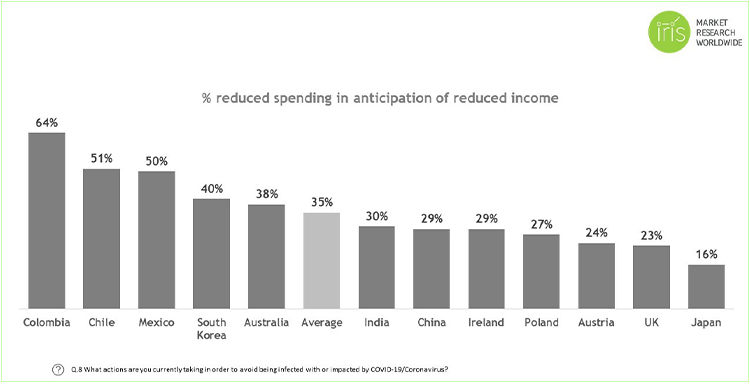
As shown in the table below, Japanese respondents were less concerned about personal financial matters, while appearing more concerned about larger-scale issues like an end to economic prosperity, job security, and “being unhappy”:
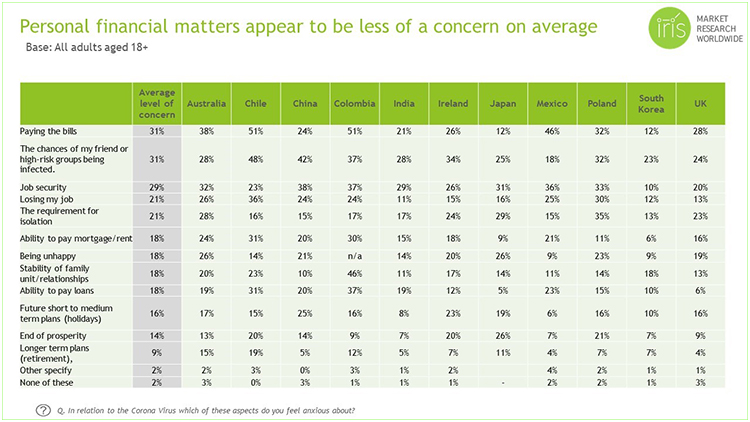
Breaking down specific concerns over personal finances, Japanese respondents showed similar sentiment to those from other countries as well:
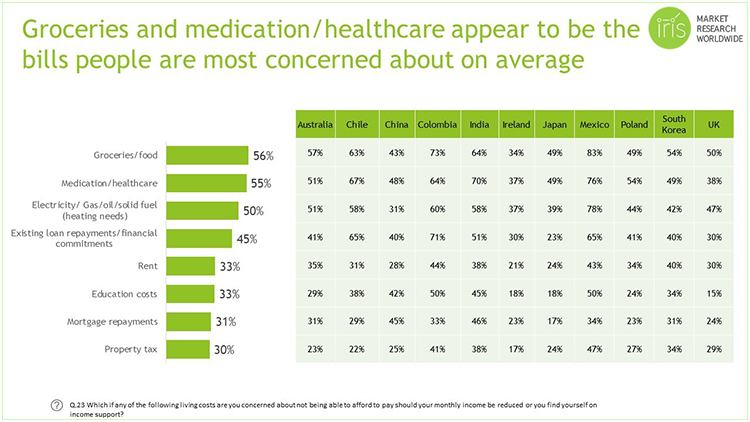
Overall, when it came to the economy, Japanese respondents were seemingly less concerned with personal finance and more concerned about the overall economic impact of the COVID-19 pandemic:
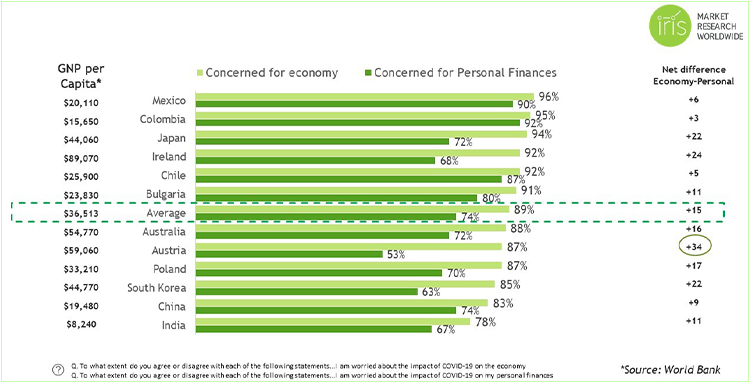
Judging from the results above, Japanese respondents appear to be more concerned with the economy on larger, more abstract terms, such as job security (but not necessarily personal job security) economic prosperity, and global recession. Japanese respondents are shown to be less concerned or are not experiencing the economic impact on an economic level. However, as the state of emergency and the suspension of regular economic activities in order to combat COVID-19 continues in Japan, these numbers are likely to (or have already started to) change.
![]()
If anxiety over the COVID-19 pandemic’s economic impact is not yet being felt on a personal level for Japanese respondents, what are they anxious about? The survey found that personal health and lifestyle restrictions from the pandemic were areas that gave Japanese respondents particular concern. However, like the results querying economic anxieties, while Japanese respondents showed significant concern about personal health and lifestyle restrictions, these worries appear to be more rooted in how the pandemic will affect others and what the future holds, rather than the immediate present.
First, as the table below indicates, the most commonly expressed point of concern for Japanese respondents, like other countries, was one’s own health, and (aside from economic concerns) the health of family members and how the virus spreads.
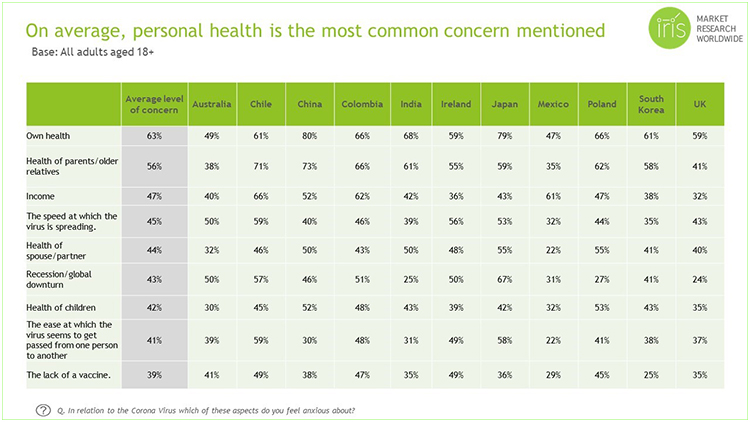
Japan was also significantly more anxious about potential lifestyle restrictions as a result of the COVID-19 pandemic, with 79 percent of Japanese respondents feeling worried:
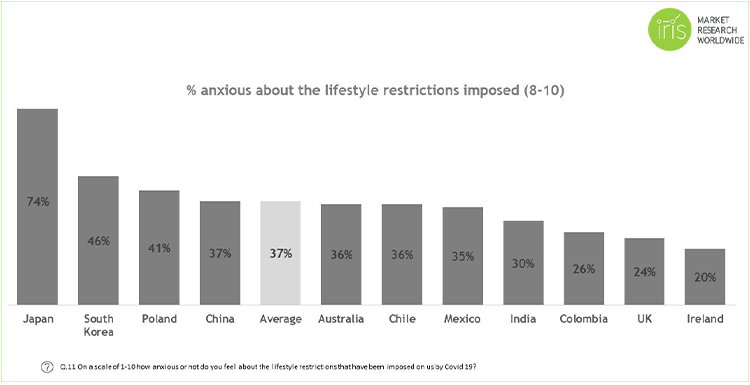
Japanese respondents also appeared to be relatively concerned about the mental and physical health of loved ones:
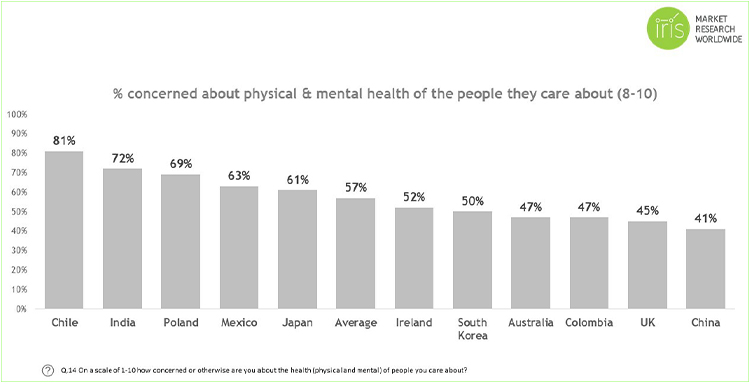
Anxieties related to the COVID-19 pandemic most felt by respondents in Japan, as shown above, can be seen to mostly involve changes in health and lifestyle.
However, when the survey measured how respondents were currently feeling, some concerns of Japanese respondents appeared to be less immediate. For instance, when it came to maintaining physical and mental fitness for themselves, 84 percent of Japanese respondents agreed that they were able to ensure a healthy lifestyle, contrasting with the previous graph showing a high level of concern for how loved ones were faring in the same regard.
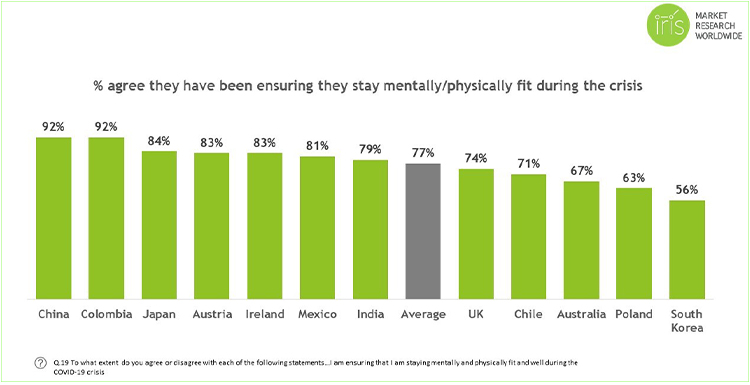
Further, compared to other countries, Japan was amongst the lowest to report a feeling of social isolation and need for social support:
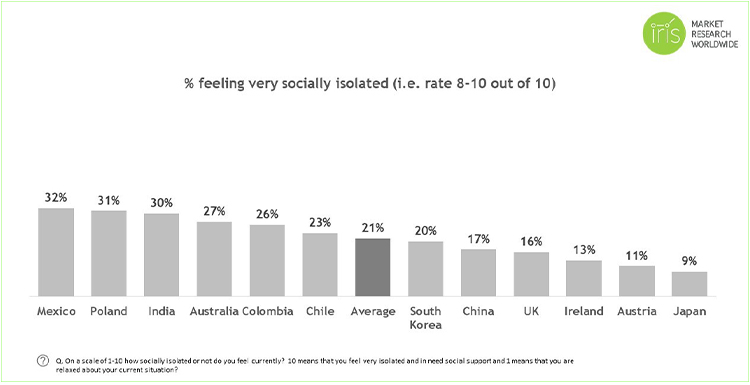
Changes in lifestyle inquired to respondents in the IRIS survey also indicated that things were remaining relatively the same for Japan, as the table below indicates:
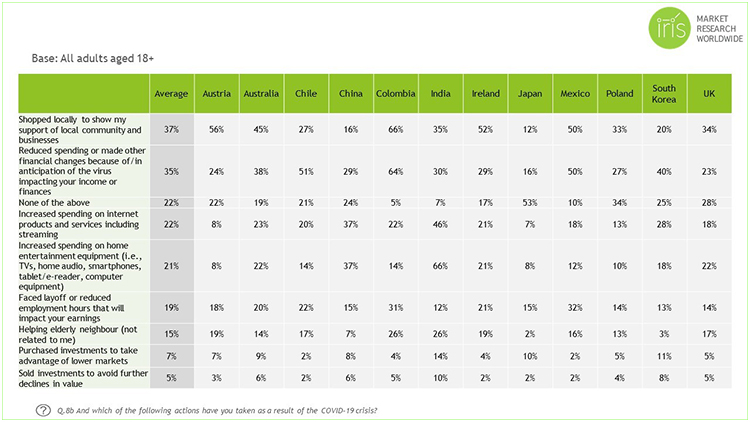
Notably, Japanese respondents were the highest in answering “None of the above” for actions taken as a result of the COVID-19 crisis. At least in the scope of the actions listed in the question above, the results from respondents in Japan suggest a lack of lifestyle changes when compared to other countries. The survey further explores this aspect when gauging interest toward doing certain activitie online while during lock-downs resulting from the COVID-19 pandemic:
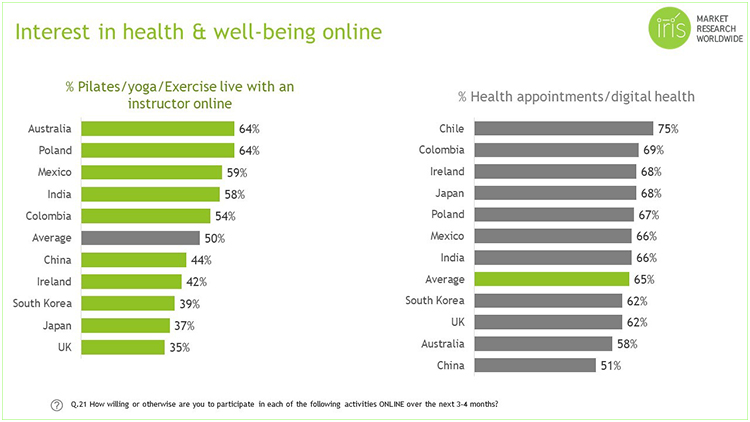
As shown above, Japanese respondents showed little enthusiasm for online exercise classes with instructors, although being slightly more interested in online medical appointments than other countries on average.
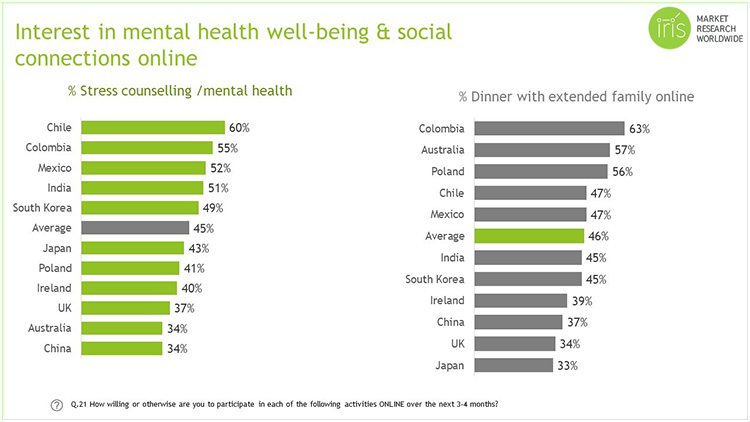
Further, as seen above, Japanese respondents were among the least interested in online dinners with family – although it should be noted that online nomikai are becoming popular among company workers during lock-down.(*2)
Japanese respondents were also lukewarm on taking cooking and baking classes online, as shown below:
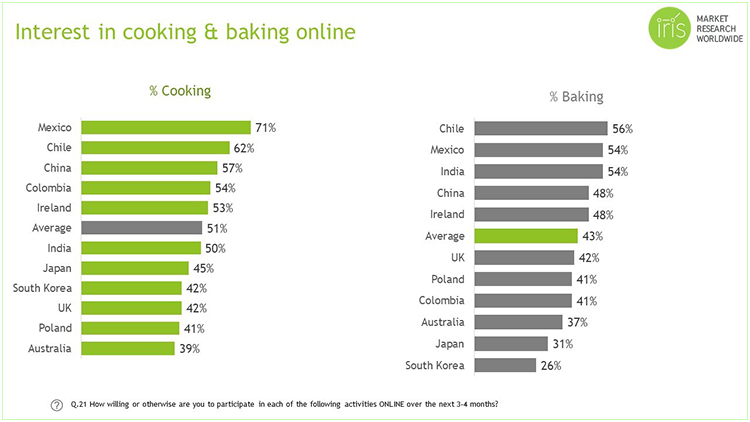
Out of all the online activities inquired about in the IRIS survey, Japanese respondents were most interested in online grocery shopping, albeit somewhat below the average level of interest in other countries:
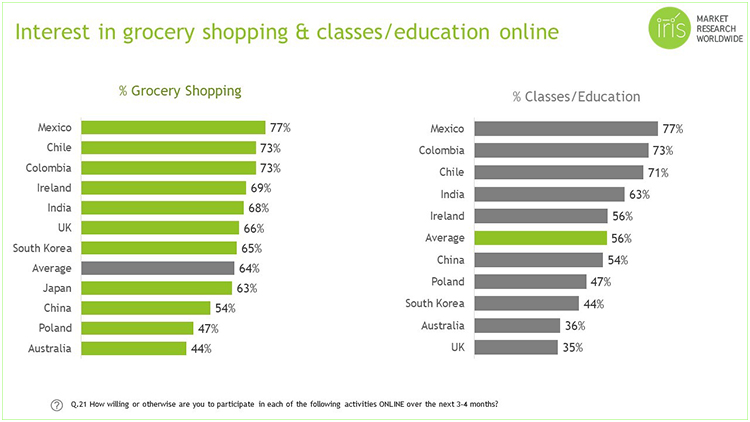
(Japan not polled on area of online education; for more information on this aspect of the state of emergency, see this article in the Nikkei Asian Review)
Concerns over lifestyle and changes in behavior as a result of the COVID-19 pandemic can therefore be seen on similar terms to concerns over economics and personal finances. Japanese respondents, while being concerned about personal health and the health of loved ones, still did not show as high a level of anxiety when it came to maintaining one’s own health and feeling isolated. High levels of concern over lifestyle restrictions were shown by Japanese respondents, but when it came to changes in behavior, Japanese respondents indicated less changes when compared to other countries in terms of everyday life. In order to get a fuller picture of Japanese public sentiment, several other aspects specific to Japanese society must also be examined, but within the context of the IRIS survey, it can be seen that Japanese respondent, while anxious over what the future holds, were still showing less changes in everyday life as a result of the COVID-19 pandemic.
![]()
In conclusion, Japanese respondents to the IRIS COVID-19 Public Sentiment Survey were primarily concerned with larger and more abstract anxieties like economic recession and how the COVID-19 pandemic will impact one’s health, the health of loved ones, and how it will impose restrictions on lifestyles. Less concern appears to be felt by Japanese respondents in terms of personal finance, job security, and lifestyle changes such as reduced spending. Changes in daily activities and enthusiasm toward taking activities online also appear to be unaltered in several areas, but it should again be noted that there are limitations in the scope of the IRIS survey when it comes to Japan that merits further research.
In the next and final article, we will look at the last area polled in the IRIS COVID-19 Public Sentiment Survey, covering attitudes and understanding toward COVID-19 as a disease in Japan. The article will also address and summarize some changes to the COVID-19 situation in Japan since the IRIS survey concluded on April 15, while posing questions for potential future research.
<< Part 1 Part 3 >>
(*1) Japan restaurants embrace takeout and seek regulars’ help in COVID-19 crisis/the japantimes
(*2)Coronavirus drives Japan workmates to drink and bond online/NIKKEI ASIAN REVIEW
